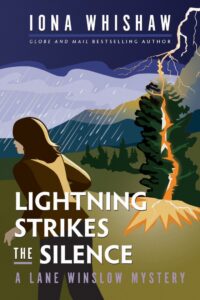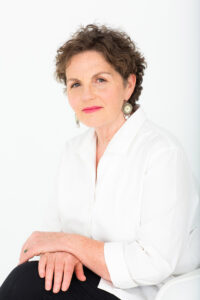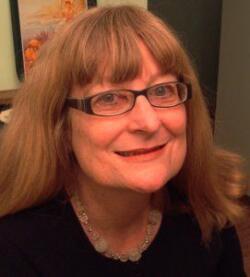A cosy mystery with bite
Lightning Strikes the Silence: A Lane Winslow Mystery
by Iona Whishaw
Victoria: Touchwood Editions, 2024
$21.95 / 9781771514323
Reviewed by Ginny Ratsoy
*

This past March, I had the pleasure of teaching a non-credit course on Canadian feminist mystery writing to about twenty members of the Kamloops Adult Learners Society, an educational organization catering to senior lifelong learners. Among other texts, we discussed Lethal Lesson, #8 in Vancouver writer Iona Whishaw’s Lane Winslow series. The class concluded that Whishaw has the cosy mystery formula down to a T: à la Agatha Christie’s Miss Marple—widely acknowledged as the progenitor of the cosy mystery—Whishaw inserts disorder into a superficially idyllic small setting, and creates a strong, determined, but socially unthreatening amateur heroine to restore order.
We noted as well that Whishaw updates and thickens the Marple plot: unlike the older and therefore semi-invisible Jane Marple, Lane Winslow is young and glamorous, a notable in her village. Whishaw’s works are examples of the evolution of the cosy mystery (in line with the times in which they are written) into a more overtly feminist form.
Readers unfamiliar with previous books in the Winslow series can be easily caught up with a few more details: Lane, recently emigrated from England, is highly visible in the years following World War Two in fictional King’s Cove, BC, where she quickly catches the eye of—and weds—Nelson’s Inspector Darling. Importantly, she retains her name and her house. Aided by several in a recurring cast, the duo disentangle a multitude of crimes, and, as in any cosy mystery, all ends pretty well. Cosy does not necessarily mean shallow, though, and, as I remarked in my review of Lethal Lesson, Whishaw has increasingly tackled social issues revolving around Canada’s historically patriarchal structure.
With Lightning Strikes the Silence, #11 in the series, Whishaw scrutinizes a dark chapter in Canadian history while simultaneously charming her readers with the picturesque Kootenay locale and setting their teeth on edge as her heroine comes perilously close to an untimely end. The writer’s pattern is to weave together two apparently dissimilar events.

In the plot that most captured this reader, the tranquility of a Kootenay summer is disrupted by a puzzling explosion that causes the death of a Japanese-Canadian mother and seriously injures her apparently mute 9-year-old daughter, Sara. Not only is the source of the explosion, in the hills above Lane’s house, baffling, so, too, is the family. Where have they come from? Why have they been hiding in the remote hills?
As Lane meticulously unravels the mystery, Sara’s family story serves as a case study of governmental oppression of Japanese-Canadians. Of course, that first received widespread public attention in 1981 through Joy Kogawa’s Obasan, an autobiographical novel about her own family’s internment and its aftermath, and has subsequently been examined in a variety of fictional and non-fictional treatments. However, Whishaw complicates her critique by adding to the plot Japan’s use of “balloon bombs” during the war. Covered under paper balloons and dispersed with the apparent intention of causing disorder in the USA, some of these bombs landed in unintended places and remained unexploded. In Lightning Strikes the Silence, the bombs not only figure in Sara’s family’s plight; they are also a RCMP tool to misplace blame on the Doukhobors.
Concurrent with Lane’s sleuthing, Darling and his able team, Sergeants Ames, Terrell, and O’Brien, face a second upsetting of the order: a Nelson jeweller is killed by an odd-shaped, hammer-like instrument in his pillaged shop. In what has become a pattern in the series, Darling’s detecting necessitates travel to England and research into events of World War One.
The unveiling of the connection between the two central mysteries is intricate. Some might say unduly so; Whishaw’s stories are certainly lengthy. Replete with plot-thickening details that range from puzzling burglaries to inclement weather, and evidence that includes out-of-place paintings, false-bottomed boxes, ink blotters, and unearthed government documents, the story lines are nothing if not knotty.
Although the solving of both mysteries in midcentury remote BC requires several crime professionals in Nelson, Vancouver, and abroad, it is Lane Winslow, the female amateur, who, arguably, risks the most and puts together the most vital pieces of the puzzle. Comfy King’s Cove is back in fairly fine fettle–apart from a few niggling details that lead the reader to wonder what our feminist cosy mystery heroine will tackle when Whishaw’s series reaches an even dozen.
*

Ginny Ratsoy is Professor Emerita at Thompson Rivers University, where she created and taught many courses. Her scholarship has focused on Canadian fiction, theatre, small cities, third-age learning, and the scholarship of teaching and learning. Recently, Ratsoy was honoured and humbled to receive the 2024 Margaret Cleaveley Award for Canadian Literature Instruction from KALS (Kamloops Adult Learners Society), where she has been a volunteer instructor since 2007 and, since her retirement in 2020, has also been involved as a board member and course coordinator. Ginny thanks her dear friend and mystery aficionado Patricia Johnson for nudging her towards the crime genre in the past five years. Patricia’s encouragement has led Ginny to reviewing multiple mysteries for the British Columbia Review, which created an opportunity to adjudicate for the 2024 Crime Writers of Canada Awards–as well as to teach and learn more about mysteries through KALS. [Editor’s note: Ginny Ratsoy has reviewed books by Danny Ramadan, Polly Horvath, Yolanda Ridge, Winona Kent, Amanda Lewis, Gregor Craigie, Iona Whishaw, Elizabeth Bass, Karen L. Abrahamson, & J.E. Barnard (eds.), and Gregor Craigie & Kathleen Fu for BCR.]
*
The British Columbia Review
Interim Editors, 2023-25: Trevor Marc Hughes (non-fiction), Brett Josef Grubisic (fiction)
Publisher: Richard Mackie
Formerly The Ormsby Review, The British Columbia Review is an online book review and journal service for BC writers and readers. The Advisory Board now consists of Jean Barman, Wade Davis, Robin Fisher, Barry Gough, Hugh Johnston, Kathy Mezei, Patricia Roy, Maria Tippett, and Graeme Wynn. Provincial Government Patron (since September 2018): Creative BC. Honorary Patron: Yosef Wosk. Scholarly Patron: SFU Graduate Liberal Studies. The British Columbia Review was founded in 2016 by Richard Mackie and Alan Twigg.
“Only connect.” – E.M. Forster